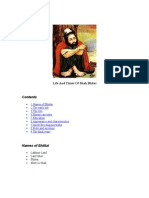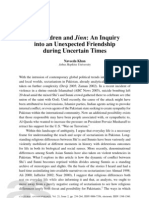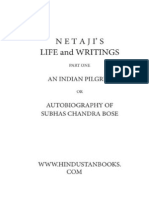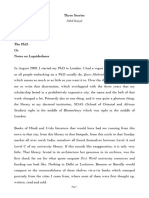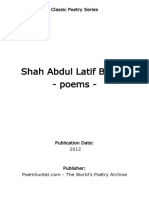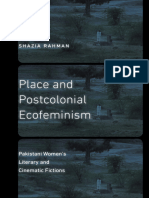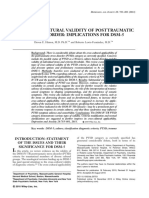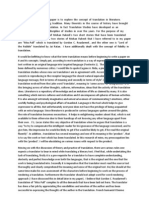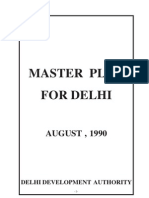BHALLA ConversationIntizarHusain 2015
BHALLA ConversationIntizarHusain 2015
Uploaded by
Ritika SinghCopyright:
Available Formats
BHALLA ConversationIntizarHusain 2015
BHALLA ConversationIntizarHusain 2015
Uploaded by
Ritika SinghOriginal Description:
Original Title
Copyright
Available Formats
Share this document
Did you find this document useful?
Is this content inappropriate?
Copyright:
Available Formats
BHALLA ConversationIntizarHusain 2015
BHALLA ConversationIntizarHusain 2015
Uploaded by
Ritika SinghCopyright:
Available Formats
In Conversation with Intizar Husain: Some Remembered, Some Imagined
Author(s): ALOK BHALLA
Source: Mānoa , 2015, Vol. 27, No. 1, Story Is a Vagabond: FICTION, ESSAYS, AND
DRAMA (2015), pp. 245-256
Published by: University of Hawai'i Press
Stable URL: https://www.jstor.org/stable/24637059
JSTOR is a not-for-profit service that helps scholars, researchers, and students discover, use, and build upon a wide
range of content in a trusted digital archive. We use information technology and tools to increase productivity and
facilitate new forms of scholarship. For more information about JSTOR, please contact support@jstor.org.
Your use of the JSTOR archive indicates your acceptance of the Terms & Conditions of Use, available at
https://about.jstor.org/terms
University of Hawai'i Press is collaborating with JSTOR to digitize, preserve and extend access
to Mānoa
This content downloaded from
122.162.148.65 on Tue, 06 Feb 2024 18:11:06 +00:00
All use subject to https://about.jstor.org/terms
ALOK BHALLA
In Conversation with Intizar Husain:
Some Remembered, Some Imagined
Meetings with Intizar Husain in Delhi are almost always interrupted. Old
Urdu scholars, aspiring novelists, young students, or acolytes walk in
and out of the room wherever he happens to be staying. Some have prior
appointments; others knock and walk in. He greets everyone with cour
tesy, an enigmatic smile, and a gentle twinkle in his eyes. I think of him
as the Bodhisattva of caravanserais who, like his favorite storyteller of the
Jataka stories, always has a new tale in response to yet another question
about his life, faith, craft, or times. But unlike the Bodhisattva—whose
Jataka tales are always about his own birth, life sufferings, and death from
generation to generation, time upon time, incarnation after incarnation—
Intizar Sahib rarely talks about himself. I am among the very few who per
suaded him, more than a decade ago in Berlin, to speak of his childhood
and life history. I was lucky and grateful for that long, recorded interview.
We had met before and have met since, but always informally. Even so,
after every meeting, I returned home and wrote down a story he had told or
his comments, because I always had the feeling that something important
had been said, however casually. Now as I look over my notes, I find intima
tions of an ethic that might serve as a guide through our cities of labyrinths
and nightmares. When you come to a forking path, he seems to say, always
choose the direction that leads through a forest and into a city where people
are free to ask questions, and where the answers they receive are grounded
in reason. Any claim to one commandment, law, desire, or identity sancti
fied by mists of holiness is dangerous, for it always leads to genocide... I am
never surprised when these days Asif Farrukhi refers to him as Master, with
a self-conscious nod towards Henry James's description of a great story
teller. Not that Intizar Sahib ever sets himself up as a teacher or a guru. He is
much too self-effacing for that and always aware of life's ironies. He under
stands that even if the Bodhisattva could be tripped, deceived, betrayed,
puzzled, or confused, then...!
Bits and pieces of the conversation we had in Berlin—remembered and
imagined—blended with another meeting recently in Old Delhi. On that
245
This content downloaded from
122.162.148.65 on Tue, 06 Feb 2024 18:11:06 +00:00
All use subject to https://about.jstor.org/terms
occasion, I drove Intizar Sahib to see the ruined arches of Dara Shikoh's
legendary library at Kashmiri Gate. In front of the arches, the empty strip
of land was strewn with garbage. He said he was familiar with such ruins in
Lahore, too. We bantered about which city had more garbage. In the vicin
ity of the library, I showed him the lovely, white Gothic domes of St. James
Church, designed by Filippo Brunelleschi and built in imitation of the cathe
dral in Florence. In the church grounds, there is a graveyard for some of the
British soldiers who died defending Kashmiri Gate during the 1857 rebellion.
The rebellion—by Indian soldiers in the British army seeking an end to
colonial rule—was led by the last Mughal emperor of India, Bahadur Shah
Zafar. On the way back, we stopped at the remnants of a sixteenth-century
stone gate of a citadel now known as Khooni Darwaza, the Gate of Blood.
Its grim name has wandered out of horror tales and folk romances, and got
mingled with Delhi's brutal history. After all, when heads of rebels are hung
from the ramparts, they summon ancient prophecies of revenge and doom.
In Intizar Husain's fictional world, historians and dervishes, storytellers
and epic poets, Bodhisattva and Sufi singers, peacocks and ghosts wander
over the sorrowing earth in search of another gate—not the gates of blood,
khooni darwazas, but gates of peace, shanti darwazas.
Intizar Husain Kahani to awara hoti hai. Story is a vagabond. For instance,
my nani, maternal grandmother, from whom I learnt the art of storytelling,
used to tell me a story in which a girl says to her father, "I love you as much
as salt." My nani didn't know about King Lear... Like Garcia Márquez, I
learnt as much about the art of storytelling from a grandmother's tales as I
did from Chekhov, Kafka, Maupassant, or Bunin. She belonged to a tradi
tion of storytelling in which space was unbounded and time was fluid; the
hero could travel across forests instantly, and ignore the borders separat
ing Heaven, Earth, and Hell. Fairy princesses and monkeys spoke classical
languages, and trees and birds told stories. This made for a more generous
world, and, of course, a more imaginatively vibrant one; and it made the
question "What does it mean to be human on this Earth?" a genuinely
inclusive one—because the answers had to account for our relations with
everything around us. It is because I am an inheritor of a way of thinking
and being in which boundaries are always porous, always shifting, that I can
accept without hesitation that there is a grave of a Muslim disciple of Krishna
in Brindaban. I've said to you something similar in the past, that the lives of
Muslims and Hindus in the subcontinent are so deeply enmeshed that the
two cannot be separated. I am convinced by what my friend and poet Sala
huddin Mahmood once said: "No Muslim is complete without Meerabai."
I have also written about how shocked and pained I was when the great
Buddhas at Bamiyan were intentionally destroyed with explosives. The stone
Buddhas were ancient, and their presence was benevolent.
246 Manoa . Story Is a Vagabond
This content downloaded from
122.162.148.65 on Tue, 06 Feb 2024 18:11:06 +00:00
All use subject to https://about.jstor.org/terms
Alok Bhalla It's becoming very difficult to say these things in the present
political circumstances, either in India or in Pakistan, without inviting the
ire of bigots of all sorts. In India, we, too, have seen the destruction of reli
gious sites. The times have become more dogmatic; we are more determined
to draw hard boundaries around our religious and national identities. Inse
cure in our own being and loneliness, we feel more aggressive about our self
hood when we are in a group—and, paradoxically, more vulnerable.
IH And more intolerant. On the other hand, modern realist fiction
confines itself within social spheres. That is, there is no magical encounter
with the non-human world; no possibility of a dialogue with it. At best the
non-human world is either a threat or available for exploitation. When Kaf
ka's man turns into an animal, there is absolutely no possibility of his ever
regaining his humanity. He becomes part of the detritus of the contempo
rary world. Actually, now we are even afraid of coming across other human
beings who look different from ourselves, and we regard them as no more
human than Gregor Samsa.
AB May I add, mischievously, this is why we insist that some individuals
must veil themselves from head to toe! Out of fear! We have begun once
again to shout slogans declaring this, that, or another religion is under threat.
More precisely, one's own religion is under threat from other religions. If
only the mantra of goodness could be found in the hysteria of crowds. Since
identity politics demands a state of perpetual vigilance, it is slowly leading
us, as extreme identity politics always does, towards genocide; how else will
we feel safe? Whatever Freud may have thought, the future of our illusions
promises to be bloodier still... We forget how violent the history of religions
has been. And I am not going to be tempted to play the nasty game of body
counts and to debate whether religious or secular thinking has killed more.
I went to Brindaban recently after translating an account you wrote of
your journey there. Unlike you, I found it depressing. No one wanted to
direct us to Wajid Ali Shah's temple. In fact, no one wanted to acknowl
edge that the temple had been financed by Shah Kundal Lai, Wajid Ali's
treasurer, or that there was a statue of Wajid Ali standing among the wor
shippers in the temple. I think that the people in Brindaban cover up these
facts by calling it Shahji's temple—thus giving it a Hindu inflection. And
when we finally got to the temple, every guide urged us not to bother to
go in but to enjoy the "sacred" gardens where "the Lord Krishna danced."
Well, there were enough dancing girls and music makers on the walls of
Shahji's temple—a bit decadent, though!
Later, at Gobindji's temple, which you describe with such fondness, the
guide—a young ardent fellow who only wanted to tell us that it had once
been very tall and that its upper stories had been destroyed by... whom
Bhalla . In Conversation 247
This content downloaded from
122.162.148.65 on Tue, 06 Feb 2024 18:11:06 +00:00
All use subject to https://about.jstor.org/terms
else but the favorite Muslim villain of the Hindu psyche, Emperor Aurang
zeb! Unfortunately, this time he was right, but I didn't like his implica
tions. There is enough religious bigotry around, and I am not interested
in what I called "revenge histories." But you'd be amused to know that the
monkeys were there, and they did steal the spectacles of a young girl ahead
of us. And then the monkeys exchanged the spectacles for food! I tried to
take photographs, but people urged me to put my camera away because
the monkeys were watching! Monkey games are more interesting than
Game of Thrones!
IH Talking about Aurangzeb... I don't know if I read it somewhere or
if someone told me that Aurangzeb's brother, Dara Shikoh—who was the
rightful heir to the throne of Delhi and was a Sufi scholar, brutally executed
after being defeated by Aurangzeb—once dreamt that he and Ramachan
draji were brothers. The history of Indian civilisation would have been dif
ferent had Dara Shikoh become emperor and lived out his dream... Any
way, this is how stories wander! Their vagabondage is ancient and endless.
AB Sometimes for good, as in the case of Dara Shikoh, and sometimes for
evil, as in the case of the guide at Gobindji's temple! If the dream of one is a
"good" story, the historical construct of the other is also a story—though a
nasty one! The story you have just told me about Dara Shikoh would rarely
travel without meeting with skepticism and scorn, and tales about Aurang
zeb's bigotry never settled in some obscure, dusty wayside! Instead, they are
passed from "guide" to "guide" and their destructive power grows!
You have at times claimed that stories hide and fall silent the moment
moralists, priests, and ideologues seize control of words. When that happens,
only editorial declarations and ideological preaching thrive. Unfortunately,
they are not recognised as fiction or hallucination! But you continue to
believe in—or at least that is what I think—the "secular" faith of a storyteller.
However, your unsympathetic critics present you as someone who is filled
with "Shia melancholy," whatever that is.
IH Interestingly, as in all Shia and Sunni families, there has been lots of
intermarrying—in our family, too! Previously, there was rarely a feeling of
difference or discrimination. Now the tensions have more to do with politics
and power than theology.
AB I have described you quite deliberately as a "secular storyteller." That's
because I think your writing is genuinely about the fate of the Earth and,
thus, in sympathy with the original concern of "secularists" from the begin
ning of time—secular being derived from Latin and meaning "of this world/
earth." Recently, as I was rereading Valmiki's Ramayana, I was surprised to
notice that its serious concern is not with the divinity of a king but with the
248 Mänoa . Story Is a Vagabond
This content downloaded from
122.162.148.65 on Tue, 06 Feb 2024 18:11:06 +00:00
All use subject to https://about.jstor.org/terms
question "Who is a good man?" The origin of the poetic impulse of the epic
is the poet's instinctive sympathy for a sorrowing female bird whose male
companion has been killed by a hunter while they were mating... Wasn't
Shakespeare right when he said that the fate of Heaven, Hell, and Earth
depends upon the fall of a sparrow?
Further, you understand that when the times are dark, the "wise story"—
as the great Buddhist poet Ashvagosha says—goes away to the forest, walks
"along the path of the wind," and waits for that time when all living and
non-living beings are again receptive to the complexity of experiences. But
you know this so well. You weave Jataka parables into your stories. These
parables were told by the Bodhisattva to perplexed monks in the forests.
Your stories are about the suffering of human beings exiled to cities by mod
ern identity politics. Such people have nothing left except pointless slogans
about injured pride, discrimination, and—since it has a contemporary
ring—let's call it jihad! All stories about identity politics today are the same.
What more is there to tell about the lonely and narrow narcissism of minor
differences—if I may refer to Freud again. But I nearly forgot: in the subcon
tinent, invoking Freud is heresy!
Intizar Sahib, let me share with you an ancient story I read recently about
the origin of stories—indeed, about the primary importance of stories,
stories that predate scriptures. Your novel Basti would surely endorse this
idea! Well, once upon a time, Parvati, the wife of the great god Shiva, asked
him to tell her a story that had never been told before by anyone, including
by him. Shiva then recited to her a story in seven hundred thousand verses.
It came to be known as the Brhatakatha [Great Story]. The next morning,
Parvati's maid began to tell her the same story, and she realised that the
maid's lover overheard Shiva telling the story the night before, and that
the lover had then told it to the maid. So, Parvati cursed the maid's lover,
exiling him to live among mortals as a storyteller, until such time as he had
told mortals the Great Story in its entirety. (The relation between the art of
storytelling and death is something Sheherzad also knows.) As luck would
have it, he was born a grammarian and a poet in a king's court—but was
exiled once again, this time to live alone in a forest, because he had failed to
teach the king Sanskrit within a set period.
Far from human society, the poet began to recite the Brhatakatha to the
forest's mysterious beings, known as pishachas—demons, ghosts, and the
mysterious dwellers in cremation grounds—in their own language. He also
wrote the story in their language on palm leaves, with his own blood. The
palm-leaf book reached the king. Appalled by the language, he exiled the
poet yet again. Dispirited, the poet decided to burn the book. As he cast
each leaf into the fire, he read the story to the animals, birds, and trees. They
became enchanted by it. When the king heard about the marvellous occur
rence, he rushed to save the book from the flames but could rescue only a
fragment.
Bhalla . In Conversation 249
This content downloaded from
122.162.148.65 on Tue, 06 Feb 2024 18:11:06 +00:00
All use subject to https://about.jstor.org/terms
It is said that the fragment became the source of many of the great stories
that have fascinated you, and that you have drawn upon them again and
again. For example, Kathasaritasagara [Ocean of Stories], Panchatantra,
tales of Vikram and the Vampire, Hitopadesha, and so forth. I wonder if this
is a way of saying that the task of the storyteller is to first "liberate" fragments
of historical, concrete, earthly, or secular time and space from amorphous
ideas of timelessness. Isn't this the reason that apsaras, nymphs, goddesses,
and gods want to break away from the divine and "storyless" realm, by
seeking human lovers—so that through their mortal children they may
have stories to tell? By the way, since the Brhatakatha story is about the first
copyright violation, I should acknowledge that I read about it in Sheldon
Pollock's history of South Asian literatures.
Keeping in mind your practice of storytelling, I want to speculate about
what may have happened to those parts of the Brhatakatha that the poet
burnt in his despair. The general historical and scholarly assumption is that
more than one-sixth of the manuscript was irrecoverably lost. The histori
ans assert this because, as you say, we have lost the capacity to pay attention
to the narratives of the non-human world—as well as of the world that has
been pushed to the outposts of dominant cultures. The poet, we should
recall, had told the stories to entranced animals, birds, snakes, ghosts,
demons, trees, plants, and rocks in the forest. Could they really have for
gotten stories that they had listened to with such deep delight? How could
they have? They must have carried the tales away with them to other forests;
they must have passed them on for generations during their gossip ses
sions, used them in their debates and discourses, and retold them to other
enchanted circles of listeners. After all, in the Vikramaditya, it is the Vam
pire who tells the king stories he has heard in the cremation grounds. In
the Ramayana, it is Jatayu, the vulture king, who narrates the story of how
Rama's father and he had been the best of friends for tens of thousands of
years—indeed, from the beginning of time. In the Mahabharata, whenever
there is an ethical conundrum, even the great teachers reach back to find a
solution in stories they had heard from animals. And then, of course, there
are the Jataka stories in which the Buddha recalls his past lives as a swan,
monkey, tree, deer, jackal, parrot, or rock. He tells them in order to reveal
the right moral path to his bewildered monks, and they, in turn, become
carriers of the stories.
The poet-storyteller is both blessed and cursed; he is exiled from Heaven
and the courts, but he understands how integrally he is "of this Earth"—that
is, secular. This seems to be the tradition in which you have been trying to
locate yourself. Isn't that why both the religious fanatics and the ideologically
motivated find it difficult to accept you?
At this point, our conversation ended abruptly, because Intizar Sahib had
been invited to lunch with Pakistan's ambassador to India. He was dressed
250 Manoa . Story Isa Vagabond
This content downloaded from
122.162.148.65 on Tue, 06 Feb 2024 18:11:06 +00:00
All use subject to https://about.jstor.org/terms
for it in a light-coloured, beautifully stitched kurta, white trousers, and a
black jacket. He smiled shyly because he knew that he looked very dapper
and distinguished.
I jotted down fragments of our conversation as soon as I could. I was
fascinated by Intizar Sahib's off-hand remark that a story, like a vagabond,
lives according to its own rules, within structures it creates. I translated the
word awara as "vagabond," not "wanderer," because the former is more
evocative of the idea that fiction, as a sort of hobo, is concerned with neither
borders nor laws.
I wonder if a story that creates its own structures and rules is also a
heretic. Intizar Sahib's narrative practice shows that a story, any story, can
be cited, recited, inscribed, engraved, or scripted in endless ways. In some
societies, this is a dangerous and potentially sacrilegious idea; it admits the
possibility that stories can contain variations of every thought, word, law,
or fatwa. Such narrative variations confirm that there are alternative inter
pretations of every commandment, and that there can be retellings of every
act of every hero, prophet, or god.
Narrative freedom is crucial for imagination and reflection. Intizar
Sahib's comment about the awarapan (vagabondage) of the imagining
mind is not merely witty. It also points to the only authentic way—literary,
social, and even religious—that cultures are created. But a culture that
opens the world to "multiple meaningfulness" is always a threat to those
who wish to issue commandments and see the world as ordained. And
they understand that their control over people's imagination is fragile.
A scriptural text with dharmic messages or oracular predictions—which
are forms of "divine manuscripts" heard and transmitted by "authorised"
priests—cannot tolerate being scrutinised by a vagrant mind, which is
free to mock ideological incoherencies, see claws hidden beneath moral
veils, and hear dark resonances in sacred narratives. That is why a man like
Aesop—with his masks of parody and store of invented animal fables—
seeks "the distinctive sophia of the abject and the disempowered" in what
is coarse, bawdy, or earthy, and must be thrown off a cliff by a mob of
believers in the prophecies of Delphic priests. And why Falstaff, that spin
ner of tall tales and mockery, has to be banished from the king's court.
Perhaps that is also why Intizar Sahib is attracted to the Jataka tales and
to the kissas—anecdotes, incidents, and narrative fragments in which ani
mals, birds, trees, and wayfarers gossip about the most mundane of things.
It may be useful to think of these narrative fragments as small, secular
theogonies rather than sacred theogonies or acts of gods at the beginning
of time. They are models of what we once intuitively performed at the time
of our creation, and have repeated ever since: acts that are primordial and
historical, wise and foolish, essential and beautiful. It is these small, secular
theogonies that enable the exiles to possess a human-sized morality, with
out the trappings of power or the charisma of heroes. Such stories in Intizar
Bhalla . In Conversation 251
This content downloaded from
122.162.148.65 on Tue, 06 Feb 2024 18:11:06 +00:00
All use subject to https://about.jstor.org/terms
Husain's works compel our attention because their non-dogmatic ethic
may yet avert the tragedy to come.
A day later, Intizar Sahib and I got another chance to talk, though again
he didn't have much time; he had to meet with others, too.
AB Why did your parents give you the name Intizar, which means
"wait"? What were they waiting for?
IH Oh, I was the fifth child. And I was born after four daughters. So, my
parents said that since a boy has made us wait for so long, his name should
be Intizar!
AB You had property in India before the Partition. When you moved
to Lahore, did you claim any compensation for all that you left behind?
My grandparents were compensated with a fairly large house when they
migrated from Lahore to Jamuna Nagar after the Partition.
IH No, I never did. People asked me to. But I always told them that the
state could never compensate me for everything. How could the state com
pensate me for the loss of the Taj Mahal or the neem tree in my courtyard?
When a neem tree, after a long period of dry heat, breaks into leaf and bud, I
realise how deeply rooted it is inside me. If the tree ever withers or if I can no
longer find it, I shall know that I have no more stories to tell.
AB It is fascinating to note that neem trees—along with green parrots—
recur in your stories. In the novel Basti, the poet—modelled on your friend
Nasir Kazmi—migrates to Pakistan with his companions after the Partition.
They wander through the labyrinths of the novel's unnamed city in search
of a neem tree. At first they mistake a tree for the neem because they are
disoriented, but are relieved when they eventually find one. Only one! Such
is the enormity of the devastation in the city. But for you, trees—especially
long-surviving ones with myths attached to them, such as the neem, banyan,
and peepal, along with parrots, mountains, and clouds—are benign presences.
Their continued existence is a sign of compassion, wisdom, community, and,
above all, stories. When people gather under the shade of a neem or a banyan,
the trees remember the stories that are told, as do the birds that roost in their
leaves. Indeed, you make wonderful use of the dastan tradition, in which the
parrots and the mynahs are either quarrelling or exchanging scandals. This
tradition offers an ironic parallel to the Islamic and Buddhist lore in which
wisdom is preached at a "conference of birds." So, when a tree is cut down—
massacred or martyred, as you sometimes put it, much to the distress of some,
I am sure—a whole history of stories is lost! Wisdom also and, I might add,
examples of non-violent living. Even the parrot and the mynah agree to a truce
every night, so that they can quarrel again later. I never told you this, but when
252 Mänoa . Story Is a Vagabond
This content downloaded from
122.162.148.65 on Tue, 06 Feb 2024 18:11:06 +00:00
All use subject to https://about.jstor.org/terms
you visited us in Hyderabad, your wife whispered to me not to tell you about
the banyan trees nearby She said you would take off to see them... as a sort of
pilgrimage!
IH You're aware that the presence of birds and trees is always a sign of
a benign, stable, and protected world. Remember the old Hindu stories
about how a big snake, Sheshnag, supports the world on its hood. The big
snakes of legends are never dangerous; it is the small snakes of society who
are truly poisonous! And in Islamic legends, it is the emerald mountain,
Qaf, which girds the earth and protects it. Qaf is the mountain that heroes
such as Hatim Tai and Amir Hamza aspire to reach. There are, of course,
many other ancient Indian, Arabic, and Persian myths in which sacred
mountains are the source of life-giving waters and healing herbs. In the
Ramayana, the monkey god Hanuman carries away a Himalayan slope on
which Sanjeevani, the life-restoring magical plant, grows.
AB And Krishna lifts an entire mountain to provide shelter to human
beings and animals from the monsoon showers. That particular story has
inspired gorgeous miniature paintings. In them, the mountain that Krishna
carries on his fingertips is always thickly forested. It is as if the painters are
recording the beauty of the trees and hills before they are slowly erased
by human civilisation—called development or progress these days. The
Krishna of these legends is also a maker of music and an erotic lover... In
one of your prose meditations on the atomic bombs tested by India and
Pakistan, you speak with gratitude about the stoic courage with which
mountains, deserts, and forests absorb the violence of the explosions, so that
human beings are unhurt. The peacocks, you say, are like the Bodhisattva in
the Jatakas... Soon after the destruction of the magnificent stone Buddhas
carved in mountain rocks at Bamiyan, you wrote a deeply moving newspa
per column about the failure of compassion that marks fundamentalist reli
giosity in our times—and not just in Taliban lands.
But sometimes, as you also know, the earth and its creatures can no lon
ger endure the violence inflicted upon them. Myths speak about that, too.
Recall that in the opening of the Mahabharata, Vyasa says that Earth prays
to the gods to exterminate human beings, because she cannot endure the
suffering they have inflicted on her. The epic is about the annihilation that
follows.
IH Well, Vyasa's world was less devastated than the one we live in now.
And Vyasa—Valmiki, too—did not dismiss as irrelevant and insignificant
the lives of trees, animals, rocks, or birds, as we have done. These creatures
had stories to tell that were important for human societies. I seem to have
read somewhere that Hastinapur was an unpolluted city. There was not a
speck of dirt anywhere. But once, when Yudhishthira sat down to eat his
Bhalla . In Conversation 253
This content downloaded from
122.162.148.65 on Tue, 06 Feb 2024 18:11:06 +00:00
All use subject to https://about.jstor.org/terms
food, he saw a fly. He was so revolted that he got up and left the city. Have
you come across the story?
AB No. But 1 can't imagine our present rulers being concerned about a
small, insignificant fly.
IH Birds can turn away from a defiled world, stop singing, and commit
suicide; trees can decide not to put out leaves and to wither... But it was
heartening to see how well kept Nehru's monument in Delhi really is. I was
enchanted by the small lake there with ducks—rajhans—swimming in it.
They were beautiful and graceful!
AB Let me ask you a question about the present state—or should I say
fate—of Pakistan. Of course, the fate of India is intricately knotted with that
of Pakistan's. You have been a very close observer of its post-1947 history
and have continuously commented upon it, even though your critics accuse
you of being an apolitical writer whose concerns lie in some nostalgic past
of undivided India. That is, of course, nonsense. But of late, the newspaper
columns you write, in Urdu and English, have become sharper and sadder.
News out of Pakistan, India, the Middle East, and elsewhere can leave one
benumbed with despair. Carnage and corruption are everywhere. One feels as
if one is living in a necropolis. Is there any sign of hope?
IH I think the future of Pakistan lies in the courage of our women. They
have suffered a lot and have been oppressed by unfair laws for decades. Yet
they have stood up and protested. I admire the manner in which the young
girl Malala Yousafzai refused to be cowed down. She insisted on the right of
girls to an education, and demanded that those who had tried to assassinate
her be punished. And then there is Mukhtar Mai, an ordinary woman from
a small village. She was gang raped on orders from the tribal council seeking
revenge against her tribe. She should have committed suicide, according to
tradition. But she refused. Instead, like Malala, she demanded justice.
AB Yes. But while Malala has gone on to win the Nobel Prize and the
world's admiration, Mai has yet to receive justice. The men who raped her
were convicted by the lower courts, but the judgement has recently been
overturned. In fact, another of Pakistan's admirable women, the lawyer
Asma Jahangir, reported that General Musharraf, who was then the presi
dent, was furious with Mai for going to the press and damaging Pakistan's
reputation. He ordered her to withdraw her case from the courts. Something
similar happened in India recently when the documentary India's Daughter
was released. The tom-tom of sacrality and tradition almost always carries
the sounds of doom for women in our region.
254 Manoa . Story Is a Vagabond
This content downloaded from
122.162.148.65 on Tue, 06 Feb 2024 18:11:06 +00:00
All use subject to https://about.jstor.org/terms
IH Still, Mukhtar Mai is an example of the kind of moral stubbornness,
if you like, that can bring about change. She got married, went back to her
village, and with all the prize money she received from the Council of Europe
in 2007, she started a school for girls. That school is still open. Gandhi may
have called such stubbornness satyagraha. You know, if I turn back to the
Jatakas, I am sure I will come across a story told by the Bodhisattva against
so-called "honour killings."
AB In one of your essays, you told such a story in two or three sentences.
But there, it is in danger of remaining an unnoticed vagabond. If I give it a
narrative form, it may go something like this:
BODHISATTVA In one of my incarnations, I was born the king of a regio
tormented by ethnic or tribal conflicts with its neighbou
daughter, the princess, eloped with the son of the rival k
DISCIPLES Really? Then what did you do? Did you send your army
bring the couple back and punish them?
BODHISATTVA
No, though all my councillors urged me to do just that. Th
said, "Your daughter has sullied the honour of our king
She must be punished with exile or death. So must the en
prince." I listened to all of them and thought compassio
ately about the desire of young couples.
DISCIPLES You did not think about your honour or what the citizen
whispered about your daughter and her lover?
BODHISATTVA
No. Instead, I sent a message to the couple. I politely an
kindly asked them to return, and promised that they w
not suffer any harm.
DISCIPLES
And did they believe you? Did they come back?
BODHISATTVA
Yes, they believed me.
DISCIPLES
What happened after that, once they came back?
BODHISATTVA
I welcomed them, celebrated their marriage, installed th
on the throne, and left the kingdom in their hands to rul
with kindness and courage.
This Jataka is a widely travelled tale because young lovers almost
have been hunted down by forces that cannot tolerate their un
libidinal energies. Valmiki heard it as he was composing the las
Ramayana. Rama exiled his wife because some citizens gossip
In another time and place, this vagabond story became a sou
such as Romeo and Juliet and for the enduring Arabic and P
Bhalla . In Conversation 255
This content downloaded from
122.162.148.65 on Tue, 06 Feb 2024 18:11:06 +00:00
All use subject to https://about.jstor.org/terms
about Laila and Majnu. In each, the story took a tragic turn because not all
tribes and families are capable of magnanimity. But then, as you know, in the
Earth's secular stories, endings are as infinite as beginnings! We will have to
meet again so that you can tell us...
As I finish writing down this conversation, I know that I cannot end it with
a Jataka about a king's humane understanding of the honour of love and of
the Earth's survival. The reality of the subcontinent has never permitted easy
resolutions. This month, for instance, there are two news stories that belong
to opposite ends of any ethical thinking, and are related to many of the
things Intizar Sahib and I have talked about over the years. The first is from
an unexpected source, and I am sure another judgement like it does not exist
anywhere in contemporary law. In May 2015, the Delhi High Court made an
extraordinary ruling in favour of those who cannot defend themselves. The
court said: "Birds have the fundamental right to fly... to live with dignity;
and they cannot be subjected to cruelty by anyone." It ordered that birds
kept in cages must be freed.
I know this must have made a deep impression on Intizar Sahib. Asif
Farrukhi once told me that every morning Intizar Sahib shares his breakfast
with birds and has done so for many years!
But before one rejoices over the High Court's ruling, one should remem
ber the great poet of sorrow, Valmiki, whose song bears witness to the killing
of a bird by a hunter. It should not be a surprise, then, if the second story
comes with the hot summer wind that blows across the northern plains of
the subcontinent and corrodes the skin. There is a small cafe in Karachi,
popularly known as T2F (The Second Floor). It was started by Shabeen
Mahmud, a forty-year-old woman who wanted to provide a space for writers
and liberal political activists to meet in a city besieged by sectarian violence.
Perhaps she thought that if there could be a law making the sky safe for birds,
there should also be a law providing for the safe exchange of words. The
locals fondly called her "pagli," mad woman. Not long ago, Intizar Sahib
and Asif Farrukhi organised a discussion at T2F about the Jataka tales. A
few weeks ago, Shabeen Mahmud was gunned down by two "hunters" on a
motorcycle...
Intizar Sahib is as much an admirer of the Jataka stories as he is of the
Mahabharata, the epic of annihilation. At the end of the Mahabharata, the
poet Vyasa has a nightmare vision of the future from which the ethical has
been eradicated. Bewildered, he exclaims: "With my arms raised I am shout
ing, but nobody listens to me; when both wealth and pleasure can be had from
Dharma, why do people not follow it? Indeed, even for the sake of one's life,
one should not cast off righteousness. Righteousness is eternal. Jiva (life) is
eternal."
May 2015
New Delhi
256 Mänoa . Story Is a Vagabond
This content downloaded from
122.162.148.65 on Tue, 06 Feb 2024 18:11:06 +00:00
All use subject to https://about.jstor.org/terms
You might also like
- Bibliography For The Bluest Eye - Annotated BibDocument3 pagesBibliography For The Bluest Eye - Annotated BibRitika Singh100% (2)
- My Feudal LordDocument254 pagesMy Feudal LordSidra MjsNo ratings yet
- Life and Times of Shah BhitaiDocument30 pagesLife and Times of Shah BhitaiTariq Hayat100% (1)
- HamletDocument23 pagesHamletRitika SinghNo ratings yet
- Butalia, Urvashi. (2007) - From The Other Side of Silence. ManoaDocument13 pagesButalia, Urvashi. (2007) - From The Other Side of Silence. Manoazainabchakera52No ratings yet
- When Does History Begin Religion, Narrative, and Identity in The Sikh Tradition by Harjot OberoiDocument270 pagesWhen Does History Begin Religion, Narrative, and Identity in The Sikh Tradition by Harjot Oberoikaran singhNo ratings yet
- Children and JinnDocument31 pagesChildren and JinnChanakya VyasNo ratings yet
- Urvashi ButaliaDocument13 pagesUrvashi ButaliaphotolumsxiNo ratings yet
- Fantastic Narrative StrategiesDocument25 pagesFantastic Narrative StrategiesSilvia LohrmannNo ratings yet
- The Philosophy of Multiracial Identity and Self Realization: Thoughts from an Ofay-Mulatto, Essayist, and Spiritual SeekerFrom EverandThe Philosophy of Multiracial Identity and Self Realization: Thoughts from an Ofay-Mulatto, Essayist, and Spiritual SeekerNo ratings yet
- Hawabai Mustafa Shah Aboriginal Tribes of India and PakistanDocument64 pagesHawabai Mustafa Shah Aboriginal Tribes of India and PakistanbillNo ratings yet
- Alok Bhalla - Memory, History and Fictional Representations of The PartisionDocument11 pagesAlok Bhalla - Memory, History and Fictional Representations of The PartisionInaam NadeemNo ratings yet
- Ganesha Goes to Lunch: Classics From Mystic IndiaFrom EverandGanesha Goes to Lunch: Classics From Mystic IndiaRating: 4 out of 5 stars4/5 (6)
- The Shade of Swords: Jihad and the Conflict between Islam and ChristianityFrom EverandThe Shade of Swords: Jihad and the Conflict between Islam and ChristianityNo ratings yet
- Heirs of a Lost Race: A Tale of Love, Ethical Courage and Universal WisdomFrom EverandHeirs of a Lost Race: A Tale of Love, Ethical Courage and Universal WisdomNo ratings yet
- Medieval Mysticism of India PDFDocument208 pagesMedieval Mysticism of India PDFRupa AbdiNo ratings yet
- Medieval Mysticism of IndiaDocument208 pagesMedieval Mysticism of IndiaPremanathan SambandamNo ratings yet
- Does Life Have A MeaningDocument2 pagesDoes Life Have A MeaningVerb8No ratings yet
- The Last Catholic Colony: An Indian Catholic Childhood: Fiction and EssaysFrom EverandThe Last Catholic Colony: An Indian Catholic Childhood: Fiction and EssaysNo ratings yet
- Bhabha (1992) The World and The HomeDocument14 pagesBhabha (1992) The World and The Homewhytheory100% (1)
- The Twice-Born: Life and Death on the GangesFrom EverandThe Twice-Born: Life and Death on the GangesRating: 4 out of 5 stars4/5 (6)
- On Being A Hindu-part1-GodDocument18 pagesOn Being A Hindu-part1-GodSanghaMitraNo ratings yet
- Legends of KhasakDocument2 pagesLegends of Khasakmeghasuresh2002No ratings yet
- Buried Treasures: The Power of Political Fairy TalesFrom EverandBuried Treasures: The Power of Political Fairy TalesRating: 5 out of 5 stars5/5 (1)
- Eternity Beneath My FeetDocument15 pagesEternity Beneath My FeetSuvidutt Sundaram100% (1)
- Speech CollectionDocument63 pagesSpeech CollectionnkjainswadheyNo ratings yet
- Zaidi IndianLiterature 2008Document7 pagesZaidi IndianLiterature 2008Ritika SinghNo ratings yet
- The Other Side of Silence Voices From The Partition of India - Butalia, Urvashi - Repr, 2014 - Penguin Books LTD - Anna's ArchiveDocument280 pagesThe Other Side of Silence Voices From The Partition of India - Butalia, Urvashi - Repr, 2014 - Penguin Books LTD - Anna's ArchiveRitika SinghNo ratings yet
- Tagore - Songs of KabirDocument13 pagesTagore - Songs of KabirGianfranco TinelliNo ratings yet
- An Indian Pilgrim by Subhash Chandra BoseDocument104 pagesAn Indian Pilgrim by Subhash Chandra BosevipulmbNo ratings yet
- Murthy Tejaswi 2007Document7 pagesMurthy Tejaswi 2007arpithaNo ratings yet
- Akhil Katyal - Three StoriesDocument10 pagesAkhil Katyal - Three StorieshikariisetsuyaNo ratings yet
- Shah Abdul Latif Bhittai 2012 10Document10 pagesShah Abdul Latif Bhittai 2012 10naran solankiNo ratings yet
- Place and Postcolonial Ecofeminism Pakistani Women's Literary and Cinematic Fictions (Shazia Rahman)Document244 pagesPlace and Postcolonial Ecofeminism Pakistani Women's Literary and Cinematic Fictions (Shazia Rahman)Aparna ReghunathanNo ratings yet
- Thought Paper TwoDocument4 pagesThought Paper TwoZoya AwanNo ratings yet
- Hadrat Sayyid Shah Abd Al-Latif BhittaiDocument8 pagesHadrat Sayyid Shah Abd Al-Latif BhittaiMohammed Abdul Hafeez, B.Com., Hyderabad, IndiaNo ratings yet
- Medieval Mystic IsDocument248 pagesMedieval Mystic Isadext50% (2)
- Ice Candy Man 'Document17 pagesIce Candy Man 'Masoom Jan100% (1)
- Needle at the Bottom of the Sea: Bengali Tales from the Land of the Eighteen TidesFrom EverandNeedle at the Bottom of the Sea: Bengali Tales from the Land of the Eighteen TidesNo ratings yet
- Anecdotes of Vataayo Faqeer-Saleem Noorhusain-2012-CompleteDocument118 pagesAnecdotes of Vataayo Faqeer-Saleem Noorhusain-2012-Completemaharinamullah50No ratings yet
- Incarnations: A History of India in Fifty LivesFrom EverandIncarnations: A History of India in Fifty LivesRating: 4 out of 5 stars4/5 (13)
- The Other Side of Silence Voices From The Partition of India - Butalia, Urvashi - Repr, 2014 - Penguin Books LTD - Anna's ArchiveDocument280 pagesThe Other Side of Silence Voices From The Partition of India - Butalia, Urvashi - Repr, 2014 - Penguin Books LTD - Anna's ArchiveRitika SinghNo ratings yet
- Decolonizing Trauma Studies A Response PDFDocument12 pagesDecolonizing Trauma Studies A Response PDFRitika SinghNo ratings yet
- The Last Yak Song - A Recount of The Decline of Pastoral Herding IDocument59 pagesThe Last Yak Song - A Recount of The Decline of Pastoral Herding IRitika SinghNo ratings yet
- Review: The Cross-Cultural Validity of Posttraumatic Stress Disorder: Implications For Dsm-5Document19 pagesReview: The Cross-Cultural Validity of Posttraumatic Stress Disorder: Implications For Dsm-5Ritika SinghNo ratings yet
- Trauma Studies BiblioDocument1 pageTrauma Studies BiblioRitika SinghNo ratings yet
- The Divine Wisdom of Michelangelo in "The Creation of Adam"Document8 pagesThe Divine Wisdom of Michelangelo in "The Creation of Adam"Ritika SinghNo ratings yet
- HamletDocument10 pagesHamletRitika SinghNo ratings yet
- Jack Wasserman Da VinciDocument14 pagesJack Wasserman Da VinciRitika SinghNo ratings yet
- HamletDocument12 pagesHamletRitika SinghNo ratings yet
- Realism MiddlemarchDocument31 pagesRealism MiddlemarchRitika Singh100% (1)
- Auerbach's StendhalDocument15 pagesAuerbach's StendhalRitika SinghNo ratings yet
- Edmund in King LearDocument31 pagesEdmund in King LearRitika Singh100% (2)
- Ham 1Document21 pagesHam 1Ritika SinghNo ratings yet
- Ham 3Document13 pagesHam 3Ritika SinghNo ratings yet
- Penn State University PressDocument17 pagesPenn State University PressRitika SinghNo ratings yet
- Charity in King LearDocument13 pagesCharity in King LearRitika SinghNo ratings yet
- Ham 1Document21 pagesHam 1Ritika SinghNo ratings yet
- Language of Indian AdvertisementsDocument8 pagesLanguage of Indian AdvertisementsRitika SinghNo ratings yet
- Concept of Translation in Literature (Mohan Rakesh)Document4 pagesConcept of Translation in Literature (Mohan Rakesh)Ritika SinghNo ratings yet
- Monuments and Archaeological Sites ASIDocument7 pagesMonuments and Archaeological Sites ASINajaf HaiderNo ratings yet
- List of Heritage Sites Under MCDDocument30 pagesList of Heritage Sites Under MCDShafaq SulmazNo ratings yet
- Rahasia Ilmu Hikmah Qurani1Document3 pagesRahasia Ilmu Hikmah Qurani1Zulfiqar Muhammad ANo ratings yet
- Unit 4 Ehs PDFDocument121 pagesUnit 4 Ehs PDFThabisNo ratings yet
- Master Plan For Delhi 2001Document180 pagesMaster Plan For Delhi 2001Sahil HarjaiNo ratings yet
- Shahjahanabad Old DelhiDocument5 pagesShahjahanabad Old DelhimonalisaNo ratings yet
- Old Delhi: Evolution of Settelments and Planning ProcessDocument30 pagesOld Delhi: Evolution of Settelments and Planning ProcessNeha RaniNo ratings yet
- Delhi TourismDocument255 pagesDelhi TourismChandra Sekar R100% (1)
- Delhi Shajahanabad and Jama MasjidDocument58 pagesDelhi Shajahanabad and Jama Masjidtanu kukreja100% (1)
- Delhi TourismDocument32 pagesDelhi Tourismmanishabisht1012No ratings yet
- Gates of DelhiDocument10 pagesGates of DelhiPROFESSOR MOROMTINo ratings yet
- Urban Renewal Plan For Walled City DelhiDocument37 pagesUrban Renewal Plan For Walled City DelhiChasity WrightNo ratings yet
- JCTSL Present Routes: S. N. Route No. Route Name Dist. Freq. Depot Alka, Choumu Pulia, Panipech, 19 30 TodiDocument3 pagesJCTSL Present Routes: S. N. Route No. Route Name Dist. Freq. Depot Alka, Choumu Pulia, Panipech, 19 30 Todiravi sharmaNo ratings yet
- GARELLAVeenaDocument9 pagesGARELLAVeenaHarpreet KaurNo ratings yet
- Form No Applicant Type Classadmitted Candidatename Gender DOBDocument50 pagesForm No Applicant Type Classadmitted Candidatename Gender DOBAshish guptaNo ratings yet
- Pin CodeDocument196 pagesPin Codenitesh12341234No ratings yet
- MPD 2001Document180 pagesMPD 2001Nikita Madan100% (1)
- Growth of Delhi As An Important Administrative CentreDocument2 pagesGrowth of Delhi As An Important Administrative CentreMahendra GuptaNo ratings yet
- MCD Civic CentreDocument34 pagesMCD Civic Centrepalin_sikari50% (2)




